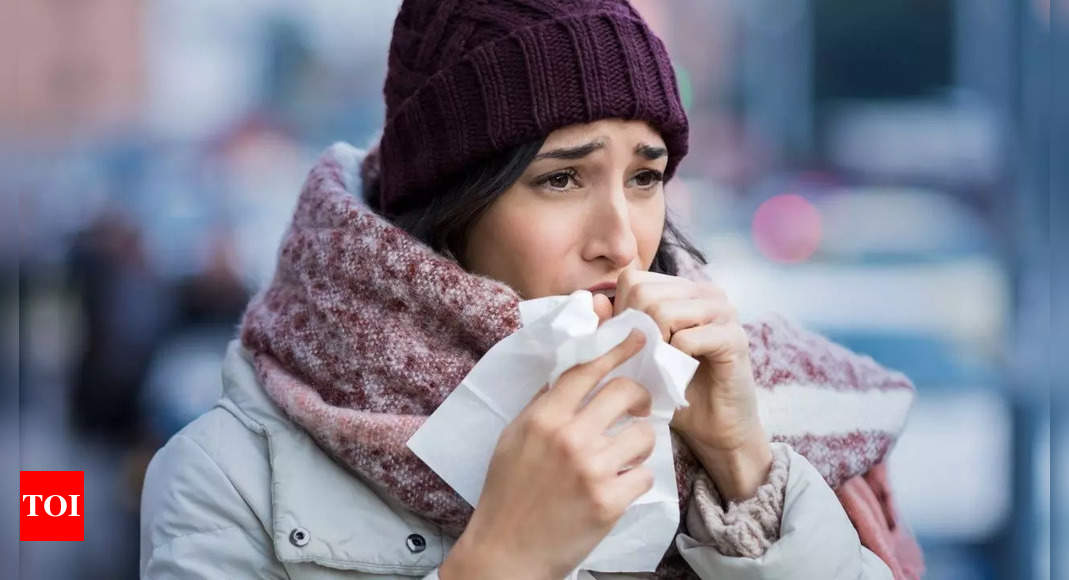To quote William Blake, “In seed time learn, in harvest teach, in winter enjoy”. But as Mignon McLaughlin said “Spring, summer, and fall fill us with hope; winter alone reminds us of the human condition”. As much it is meant as a season to relax, enjoy and reap the benefits of a yearlong hard work, winter is a season which also brings its shares of problems like frequent infections, particularly of the respiratory and gastrointestinal tract and ailments related to the skin.
Reduction in immunity owing to drop in temperature is quoted as the reason for such propensity to frequent infections. Also, due to the ability of certain microorganisms to survive and multiply better in colder environment, food kept cold for a long time and not reheated properly can act as a source of certain food borne infections, including typhoid.
Respiratory infections frequently manifest as sore throat, couch, cold, nose stuffiness/discharge and fever. Risk of respiratory infections is high in children, elderly, diabetic individuals with poor blood sugar control, people with cancer, in smokers and those with underlying lung conditions like Asthma. Number of people visiting medical and pediatric OPDs with respiratory infections is significantly high in winters and this year the trend is of prolonged illness following an episode of infection and this prolonged illness manifests as prolonged cough and breathlessness, which indicated significant airway inflammation due to viruses or bacteria. Viruses by far are the most common infecting pathogens.
Reduction of risk of such respiratory infections includes three elements
1. Protection against environment
2. Improving respiratory immunity
3. Good food hygiene
Protection against environmental factors implies keeping ourselves warm enough to prevent fluctuations in body temperature. Winter, when seen as nature’s initiative for us to show of our fashion sense, it should be complied with good warm clothing, particularly of the highly vulnerable group; children and elderly.
Respiratory immunity can be improved by:
1. Good exposure to clean air
2. Regular physical activity and exercise
3. Vaccination/ immunisation
It is wise to remember that there is no quick fix to improving the immune system and it takes consistent and regular work to keep our immune status updated to good health. Exposure to clean air is quite a crucial measure in this regard; though it is completely not in our control to achieve it. This can be compensated with regular and sustained physical activity and exercise. Exercise capacity for each individual is different and at different age, and hence it is ideal for those above the age of 45 and those with underlying family history of heart disease to consult their doctor/ cardiologist prior to deciding on the mode of exercise. Those with no major comorbid illness can choose to go ahead with regular brisk walk, jog, cycling or a daily session at the gym to improve their endurance and immunity. It is wise for those with Asthma to consult their pulmonologists before deciding on the mode and duration of exercise. Research shows that at least 30 minutes of sustained exercise per day, for at least 5 to 6 days per week is good immunity booster.
Vaccinations are key to overcoming the risk of major respiratory infections, particularly in the high-risk group, as outlined before. It is strongly recommended to go ahead with Influenza vaccination, ideally in the month of October or November, prior to peak winter seasons, though it’s never to late for this vaccination. Children should be up to date with their immunization schedule. Those with frequent worsening of Asthma, chronic smokers and those with heart, kidney or liver diseases also benefit with Pneumococcal vaccine.
Food hygiene is of great importance throughout the year and is key to avoid food-borne infections, including Typhoid. Avoid uncooked, inadequately heated foods including chutneys, salads, ice creams, curds, juices and unprocessed cheese from non-standard places to avoid such infections. People who frequently travel and eat outside, young children and cancer survivors benefit from Typhoid vaccine.
As poetess Anne Bradstreet said “If we had no winter, the spring would not be so pleasant: if we did not sometimes taste of adversity, prosperity would not be so welcome.” Lets make the best of winter with good health: with exercise, vaccination, clean air and food hygiene being the key to such wellbeing.
Authored by: Dr. Vinay D. MD FNB FRSPH, Senior Consultant Infectious Diseases, Adult Vaccinology and Travel Medicine, Apollo Hospital Bannerghatta Road, Bangalore
Winter wellness guide: Tips for staying healthy and strong amid seasonal challenges

Visited 1 times, 1 visit(s) today
